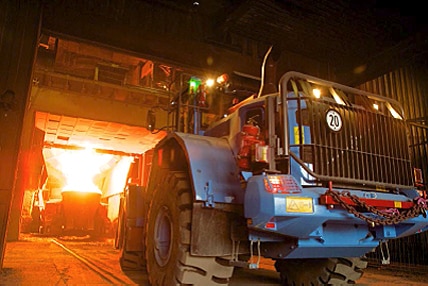Despite temperatures of over 1,000 degrees, a fleet of modified Volvo wheel loaders is keeping its cool at Detlef Hegemann’s molten steel mill in Northern Germany.

Lying 60km south of the North Sea coast, Bremen – with a major port on the River Weser – is a city in northwestern Germany known for its commercial and industrial heritage. With a major port on the River Weser, Bremen has a population of three million, making it the second biggest city in northern Germany.
The Hegemann Group was established in 1914, founded in Bremen by Reiners – a construction company that specialized in railway infrastructure. Hegemann now specializes in metal construction, engineering, environmental and technically driven construction practices.
Detlef Hegemann GmbH has been operating a steel mill in Bremen for over 30 years, treating steel slag and transporting steel parts. Slag is the waste product produced from steel production, which flows white hot at 1,200 °C into 80 tonne slag pots. This is driven to a cooling tank in special vans and given time for the temperature to fall. The cooled slag is then broken down and fed in to Hegemann’s separation system, where any metal remaining is removed from the waste product.
Working in these severe conditions requires robust and specialized equipment, which is why Hegemann modified remote-controlled L150G-Series wheel loaders from Volvo Construction Equipment (Volvo CE) to withstand extreme temperatures and conditions. Hegemann has been using the machines since October 2013 and in their first months of operating are proving to be reliable and durable. Hegemann also has two L350F-Series and two L180G-Series wheel loaders working at the mill.
Operations heat up
The remote-controlled Volvo L150G wheel loader moves the molten steel to a storage area to cool down. Normal construction equipment wouldn’t be able to endure the heat so the machines were modified by Volvo dealer, Swecon Baumaschinen GmbH. The L150G wheel loaders’ plastic parts were replaced to guard against red-hot flying sparks and molten splashes. The sensitive electronics under the bodywork metal have also been made heat resistant and the loader arm cylinders were resisted for further protection. The hydraulic hoses and pipes were also given extra protection and shielded with steel plates.
The central lubrication system has been safeguarded from fire and the underbody, front and rear panels have all been applied with lithium greases, which act as a shield against high temperatures. Bulletproof glass has been installed and metal sheets reinforce the hood and cab roof. A fixed mount tow chain on the wheel loader can also be used in an event of a breakdown, so it can be hauled out of danger by another wheel loader. Through a wireless remote control joystick, the machines can be operated from up to a distance of 100 meters away, keeping operations safely out of harm’s way.
The two L150G wheel loaders are just two of the fleet of wheel loaders that are currently working across Hegemanns’s 25 large scale facilities with everything from the L40B to the largest machine – a L350F fitted with tire chains to protect against tough terrain at the steel mills in use. The company also use a Volvo A25 articulated hauler.
“The Volvo machines are definitely worth it because the price is outweighed by performance,” says plant manager Holger Lammers. “The machines are reliable and Swecon’s service is excellent.”
Source: Volvo CE
Latest Events News
- CONEXPO-CON/AGG Announces the Expansion of Next Level Awards Program and Introduces New Exhibit Design Awards for 2026
- SAMOTER 2026: COUNTDOWN TO THE NEXT INTERNATIONAL CONSTRUCTION MACHINERY EXHIBITION
- Operator Challenge returns to PlantWorx 2025 – JCB joins as headline sponsor
- CIM Leiria Announced as Guest Region at Portugal Smart Cities Summit 2025
- Highly Anticipated Industry Expo Returns to Prince George This Week
 Constructionshows
Constructionshows